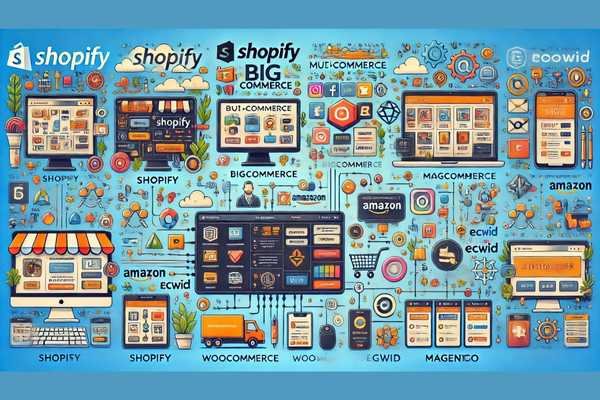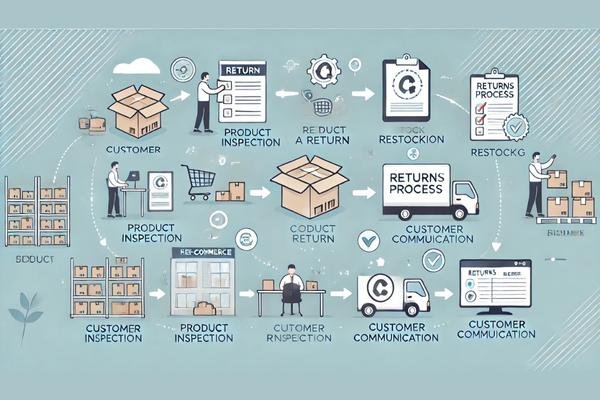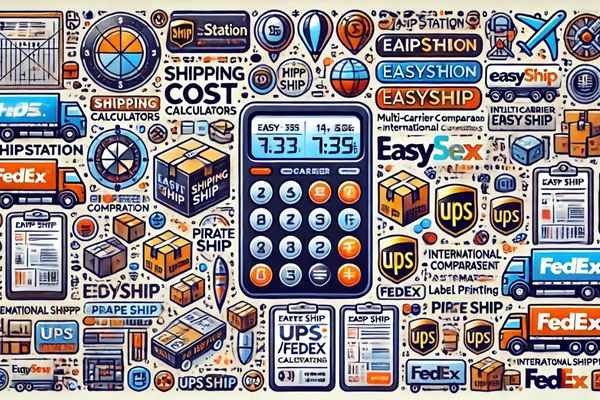
Top 5 Online Store Platforms for Small Businesses in 2025
October 2, 2024
Best E-commerce Platforms with Advanced SEO Features for 2025
October 2, 2024In today’s fast-paced digital world, selling products through multiple channels is crucial for any successful e-commerce business. Multi-channel selling allows you to reach customers on various platforms, including your own website, social media, online marketplaces, and even physical stores. With the right e-commerce platform, you can streamline your operations, manage inventory more effectively, and grow your business faster.
In this article, we’ll explore the top 5 e-commerce platforms for multi-channel selling, discussing their features, pros, cons, and why they stand out for digital marketing professionals, developers, and content creators. Whether you’re just starting or looking to scale, these platforms offer powerful tools for multi-channel success.
Table of Contents
1. Shopify – The Go-To Platform for Multi-Channel Selling
Shopify is widely regarded as one of the best e-commerce platforms for multi-channel selling. It offers seamless integration with a variety of sales channels, including social media platforms like Facebook and Instagram, online marketplaces such as Amazon and eBay, and even offline through its POS system.
Key Features:
- Channel Integrations: Sell directly on Facebook, Instagram, Amazon, eBay, and Walmart.
- Shopify POS: Allows for in-store sales, making it perfect for businesses that operate both online and offline.
- Inventory Management: Centralized control over inventory across all channels to prevent overselling.
- Mobile App: Manage your store and channels from anywhere with Shopify’s mobile app.
- Third-Party Apps: Access to over 6,000 apps to extend Shopify’s functionality for marketing, sales, and logistics.
Pros:
- Easy setup and user-friendly interface.
- Excellent customer support and resources.
- Flexible payment gateway options with Shopify Payments or third-party providers.
- Excellent for businesses of all sizes.
Cons:
- Monthly fees can add up as you grow and need more advanced features.
- Limited customization options unless you’re proficient with coding.
Why Choose Shopify?
Shopify’s flexibility and robust multi-channel integration make it an ideal choice for businesses looking to grow across multiple sales platforms without the hassle of managing separate inventories or customer data.
2. BigCommerce – A Powerhouse for Large-Scale Multi-Channel Sellers
BigCommerce is another top contender for multi-channel selling, especially for larger businesses with complex needs. It offers built-in multi-channel integration with leading platforms, from Google Shopping and Amazon to Instagram and TikTok.
Key Features:
- Multi-Channel Selling: Direct integrations with major platforms, including Amazon, eBay, Facebook, Instagram, and Google Shopping.
- Advanced SEO Tools: Built-in SEO features that help increase visibility across different sales channels.
- Customizable Checkout: Fully customizable checkout processes for a tailored customer experience.
- No Transaction Fees: Unlike Shopify, BigCommerce doesn’t charge additional transaction fees on top of credit card processing fees.
Pros:
- Scalable platform that supports high-volume sellers.
- Comprehensive SEO and marketing features.
- Robust API and developer tools for custom solutions.
- No extra fees for sales or transactions.
Cons:
- Steeper learning curve for beginners.
- Pricing plans can be higher than competitors for smaller businesses.
Why Choose BigCommerce?
BigCommerce excels in scalability and customization, making it the best choice for businesses with large inventories or those looking to build out custom workflows. Its multi-channel integrations are built-in, allowing you to sell everywhere seamlessly.
3. WooCommerce – The Most Customizable Multi-Channel Platform
WooCommerce, the e-commerce plugin for WordPress, is highly customizable, making it a favorite for developers and tech-savvy entrepreneurs. While it doesn’t come with built-in multi-channel selling, you can easily integrate third-party solutions to sell across various platforms.
Key Features:
- Open-Source: Free to use and highly customizable, giving you full control over your online store.
- Integration with WordPress: Perfect for businesses already using WordPress.
- Multi-Channel Extensions: Add-ons for integrating with Amazon, eBay, Facebook, and Instagram.
- Payment Options: Extensive support for different payment gateways, including Stripe, PayPal, and credit cards.
Pros:
- Free to use (though you’ll need to pay for hosting and add-ons).
- Fully customizable with thousands of themes and plugins.
- Strong community support for troubleshooting and improvements.
- Excellent for SEO, especially if you’re familiar with WordPress.
Cons:
- Requires more technical knowledge to set up and maintain.
- Add-on costs can add up for multi-channel functionalities.
- Hosting and maintenance are your responsibility.
Why Choose WooCommerce?
For businesses that want full control and customization, WooCommerce offers unbeatable flexibility. While you need to add third-party integrations for multi-channel selling, this platform is an excellent choice for developers and businesses with specific requirements.
4. Magento (Adobe Commerce) – The Best for Large Enterprises
Magento, now known as Adobe Commerce, is a powerful open-source platform used by some of the largest brands worldwide. It is feature-rich and designed for businesses with large inventories and complex multi-channel needs. Although it requires significant technical expertise, Magento offers a flexible and scalable solution for large e-commerce businesses.
Key Features:
- Multi-Channel Support: Sell across different platforms, including Amazon and eBay, through integrations and extensions.
- Scalability: Supports massive product catalogs and high-traffic volumes.
- Customizable Design: Full control over the design and functionality of your store.
- Advanced Analytics: Built-in analytics tools that offer insights into customer behavior across different channels.
Pros:
- Highly scalable for large businesses.
- Full control over every aspect of your online store.
- Extensive marketplace for extensions and integrations.
- Great for international selling with multiple language and currency support.
Cons:
- High development and maintenance costs.
- Requires a lot of technical knowledge to set up and manage.
- Hosting is not included, adding to overall costs.
Why Choose Magento?
Magento is the go-to platform for large enterprises that need a customizable, scalable solution for multi-channel selling. Its advanced capabilities make it perfect for managing multiple sales channels, inventories, and customer segments.
5. Ecwid – The Best Free Multi-Channel Selling Solution
Ecwid stands out as a free, user-friendly solution for small businesses that want to get started with multi-channel selling. It integrates easily with existing websites and offers built-in support for selling on platforms like Facebook, Instagram, and Amazon.
Key Features:
- Free Plan: Offers a completely free plan that allows you to sell on multiple channels.
- Easy Setup: Simple to install and integrates with any website.
- Multi-Channel Selling: Sell on Facebook, Instagram, Amazon, and more with minimal setup.
- POS Integration: Includes a point-of-sale feature to sell in physical locations.
Pros:
- Free plan available, ideal for small businesses and startups.
- Extremely easy to use and integrate with existing websites.
- No need to migrate to a new platform if you already have a website.
- Built-in multi-channel selling options at no extra cost.
Cons:
- Limited features compared to other platforms.
- Paid plans are necessary for advanced features.
- Customization is limited unless you upgrade.
Why Choose Ecwid?
Ecwid is perfect for small businesses or startups that need an affordable, easy-to-use solution for multi-channel selling. Its free plan allows you to start selling on multiple platforms with minimal investment, making it an attractive option for businesses just starting out.
Top 5 E-commerce Platforms for Multi-Channel Selling Comparaison
Top 5 E-commerce Platforms for Multi-Channel Selling
| Platform | Key Features | Best For | Link |
|---|---|---|---|
| Shopify |
– Integrations with Facebook, Instagram, Amazon, and eBay – Shopify POS for in-store sales – Centralized inventory management | Small to medium-sized businesses | Visit Shopify |
| BigCommerce |
– Direct multi-channel integrations – No transaction fees – Advanced SEO tools and customizable checkout | Large-scale and high-volume sellers | Visit BigCommerce |
| WooCommerce |
– Open-source with full customization – Extensions for multi-channel selling – Seamless WordPress integration | Developers and tech-savvy businesses | Visit WooCommerce |
| Magento (Adobe Commerce) |
– Supports large inventories – Multi-channel and international selling – Highly scalable for enterprises | Large enterprises with complex needs | Visit Magento |
| Ecwid |
– Free plan for multi-channel selling – Integrates with Facebook, Instagram, and Amazon – Easy setup for existing websites | Small businesses and startups | Visit Ecwid |
Frequently Asked Questions
What is multi-channel selling, and why is it important?
Multi-channel selling refers to the practice of selling products across multiple platforms, such as your website, social media, and marketplaces like Amazon or eBay. It’s important because it allows you to reach more customers, increase brand visibility, and maximize sales opportunities.
Can I manage all my sales channels from one platform?
Yes, most of the platforms mentioned, like Shopify and BigCommerce, offer centralized dashboards that allow you to manage inventory, orders, and customer information across multiple channels. This simplifies operations and helps prevent overselling.
Which e-commerce platform is the best for multi-channel selling?
The best platform depends on your business needs. Shopify is great for beginners and medium-sized businesses, while BigCommerce and Magento are better suited for larger enterprises. WooCommerce offers flexibility for those who want full customization, and Ecwid is ideal for small businesses.
Conclusion
Choosing the right e-commerce platform for multi-channel selling can significantly impact the growth of your business. Each of the platforms listed above offers unique features tailored to different types of businesses, whether you’re a small startup or a large enterprise.
In 2024, businesses need to focus on selling across multiple platforms to stay competitive. Whether it’s Shopify’s easy-to-use interface, BigCommerce’s scalability, WooCommerce’s customization, Magento’s enterprise-level features, or Ecwid’s affordability, there’s a solution for every type of business.
By selecting the right platform, you can streamline your operations, expand your reach, and ultimately, grow your e-commerce business across all channels.








